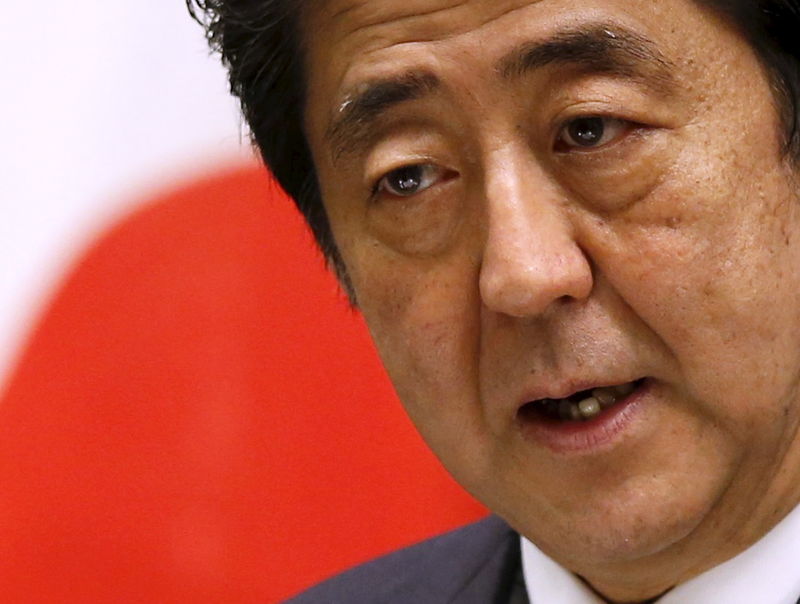By Linda Sieg and Kaori Kaneko
TOKYO (Reuters) - Japanese Prime Minister Shinzo Abe looks set to win a rare second consecutive term but economists predict he won't use that victory to push through bold reforms such as labor market changes that are considered vital for long-term growth.
Instead, Abe, who took office in December 2012 pledging to reboot the economy, will stick to politically palatable policies of government spending and easy money - the first and second "arrows" of his "Abenomics" recipe, economists polled by Reuters said.
Abe has spent significant political capital this past year pushing unpopular legislation, expected to pass this month, that could let Japanese troops fight overseas for the first time since World War Two. He was also busy crafting a controversial statement to mark the 70th anniversary of that conflict's end.
"He will draw a line under the issues of security and history in this session of parliament, and from autumn onward, the focus will be growth strategy," a Japanese government source close to the administration told Reuters.
Fifteen economists who responded to a Reuters poll overwhelmingly said Abe in his next term should put priority on regulatory reform of the labor market and repairing a social security system burdened by a fast-ageing population.
Equally overwhelmingly, respondents expect Abe's government instead to plump for an extra budget for the current fiscal year to bolster growth. About half also expect more monetary easing.
"Even with the weak yen, capital investment centered on the manufacturing sector is not growing. This shows ... expectations for growth are still insufficient," said Kyohei Morita, chief Japan economist at Barclays (LONDON:BARC) Capital. "What is vital is to increase labor productivity and reform the labor market.
Candidates for a Liberal Democratic Party (LDP) leadership election must register on Tuesday.
Abe's only potential rival is struggling to get enough sponsors for a bid, while Abe has the backing of major LDP factions. That makes him all but certain to win another three-year term as party leader, and hence premier, by virtue of the ruling coalition's majority in parliament.
Abe has made progress reforming the energy, medical and farm sectors, but economists want more of the bold reforms that are the "third arrow" of Abenomics.
The yen has eased more than 30 percent against the dollar and Tokyo share prices and corporate profits have more than doubled since Abe took over as head of the then-opposition LDP in September 2012 and then led the party to victory at the polls.
But corporate investment is sluggish and wage rises have failed to keep pace with higher prices, dampening consumption.
GDP shrank an annualized 1.6 percent in the April-June quarter due to an export slump and weak consumer spending.
Delays in clinching a 12-nation pan-Pacific trade pact, the U.S.-led Trans-Pacific Partnership, are weakening external pressures for difficult structural change, said Martin Schulz, a senior research fellow at Fujitsu Research Institute.
"Abe probably had a much bigger mandate at the beginning to implement reform," he said.
Government efforts to address widening economic gaps ahead of an upper house election next July could also put structural reforms on the back burner. "This is what kills reform. That is a possibility," Schulz said.
